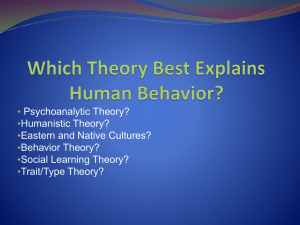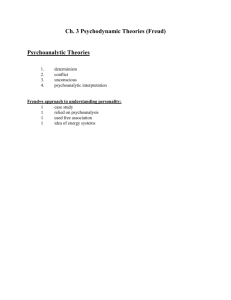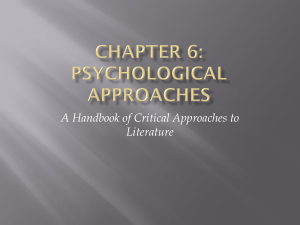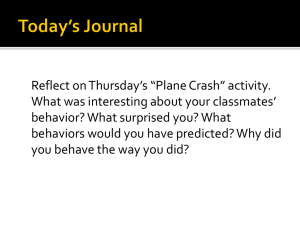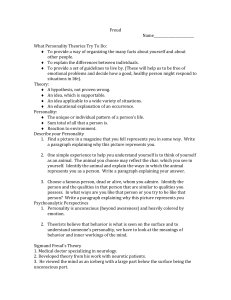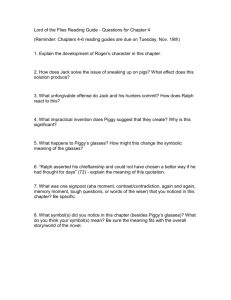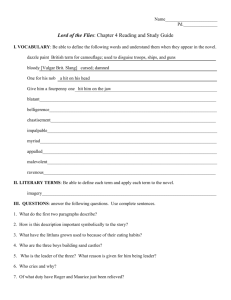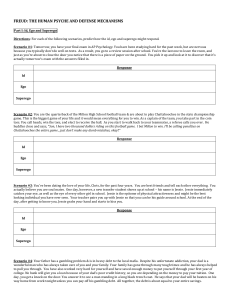Psychoanalytic Theory An Introduction
advertisement
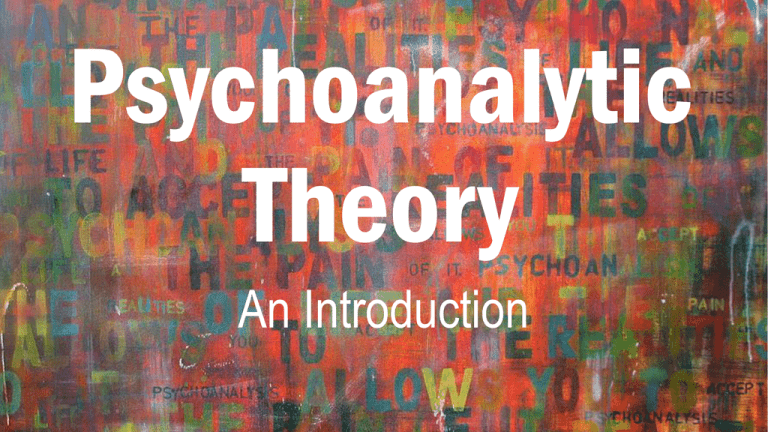
Psychoanalytic Theory An Introduction INTRODUCTION TO PSYCHOANALYTIC THEORY • Sigmund Freud is the author of the structural model of personality. • each person’s personality is formed of three parts: • Id — part of the personality that contains our primitive impulses—such as thirst, anger, hunger—and the desire for instant gratification or release. • Superego — part of the personality that represents the conscience, the moral aspect. • Ego — Part of the personality that maintains a balance between our impulses • Psychoanalysis is the process of using what we know about these three parts of someone’s personality to analyze the ways that person behaves. • Literary critics sometimes analyze the actions of literary characters using the three personality structures that Freud identified. • As critics explore the ego, superego, and id of characters in a work, they focus on the ways that these parts of the characters’ personalities influence the work as a whole. • This process is called psychoanalytic criticism. Lord of the Flies Psychoanalytic Theory The Id • The Id of the novel is conveyed through the character of Jack’s • Jack’s desires power and he wants it now. He becomes a monomaniac and is obsessed with his desire to kill a pig. He refuses to listen to how this is bad or how he should do something else. He is willing to resort to unlawful activities to get what he wants. He is violent and lawless. • He reacts against order and always wants his way at the cost of society. Jack tries to get power by preying on fears of the beast with out thinking of how devastating this could be to the littluns. • In short, all of his actions are exactly those of a little and undeveloped child who is ruled by the Id. The Superego • The Superego of the novel is conveyed through the character of Piggy. • He is the intellectual, observant, scientific boy in the group. • Piggy always follows the rules of conscience and society. Piggy always tries to recreate the society that they had at home and school. • He constantly tells the other boys when they are doing the wrong thing and tells them that they are departing from civilization. He is never violent and is kind to the littluns as seen when he is the one to speak for a shy littlun scared of the beastie. He tries to debunk the myths of the beast to prevent panic. • He tries to prevent the Id from running wild. He fights for democracy and is the enemy of Jack (Id). The Ego • The Ego of the novel is conveyed through the character of Ralph. • Ralph is the level headed leader who works to keep a balance between the civilized and primitive on the island. • “Ralph wept for the end of innocence, the darkness of man’s heart, and the fall through the air of the true wise friend called Piggy” (202). • By understanding the darkness of man and realizing its terrible outcomes, Ralph is demonstrating his ability to be rational and aware, which supports his portrayal of the Ego within the novel. The Allegory • In The Lord of the Flies the boys are on an island and the Id and the Superego are fighting for control. • Some of these battles are the Signal Fire, the Huts and Failed Meeting. • If you look, you can see how Piggy/Superego is trying to keep the group organized and moral while Jack/Id is disrupting it. • Also you can see Ralph/Ego trying to recreate a democratic society where everyone is happy. • The whole book shows the way that the Id, the Ego and the Superego try to work as one when they have no way to escape each other.

